HSH762: Priority Setting in Healthcare Systems Analysis
VerifiedAdded on 2022/10/01
|11
|3065
|157
Report
AI Summary
This report analyzes the need for an independent agency to undertake priority setting in the Australian healthcare system, arguing that it would minimize political influence and ensure unbiased decision-making. It emphasizes the importance of community engagement in identifying ethical principles for resource allocation, advocating for explicit resource allocation and due process. The report proposes ethical principles such as affordability and addresses key issues in priority setting, including efficiency and justice, while applying economic theory to healthcare resource allocation. The assignment explores the application of the demand and supply theory to healthcare services and the role of priority setting, and it concludes by highlighting the importance of ethical considerations in the Australian healthcare system.
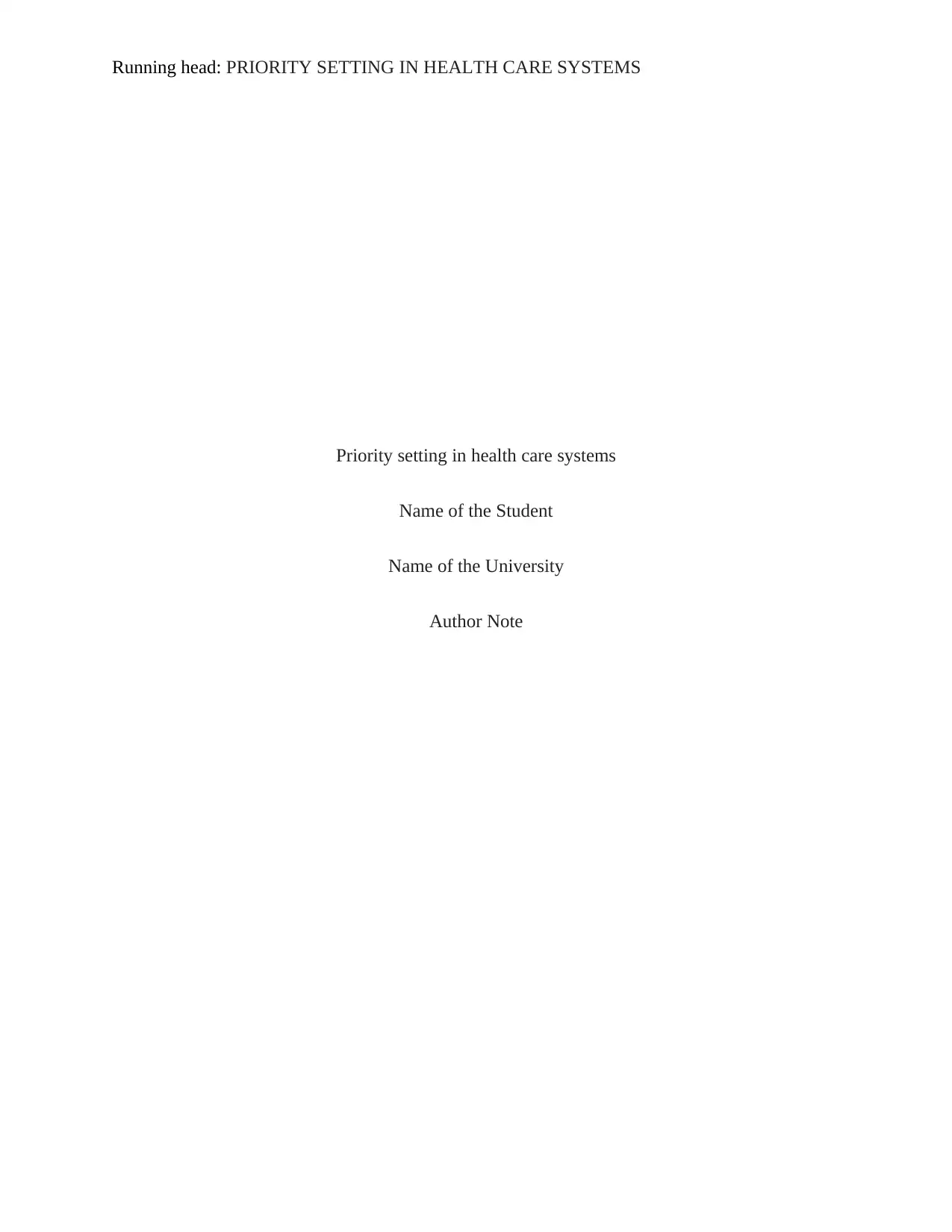
Running head: PRIORITY SETTING IN HEALTH CARE SYSTEMS
Priority setting in health care systems
Name of the Student
Name of the University
Author Note
Priority setting in health care systems
Name of the Student
Name of the University
Author Note
Paraphrase This Document
Need a fresh take? Get an instant paraphrase of this document with our AI Paraphraser
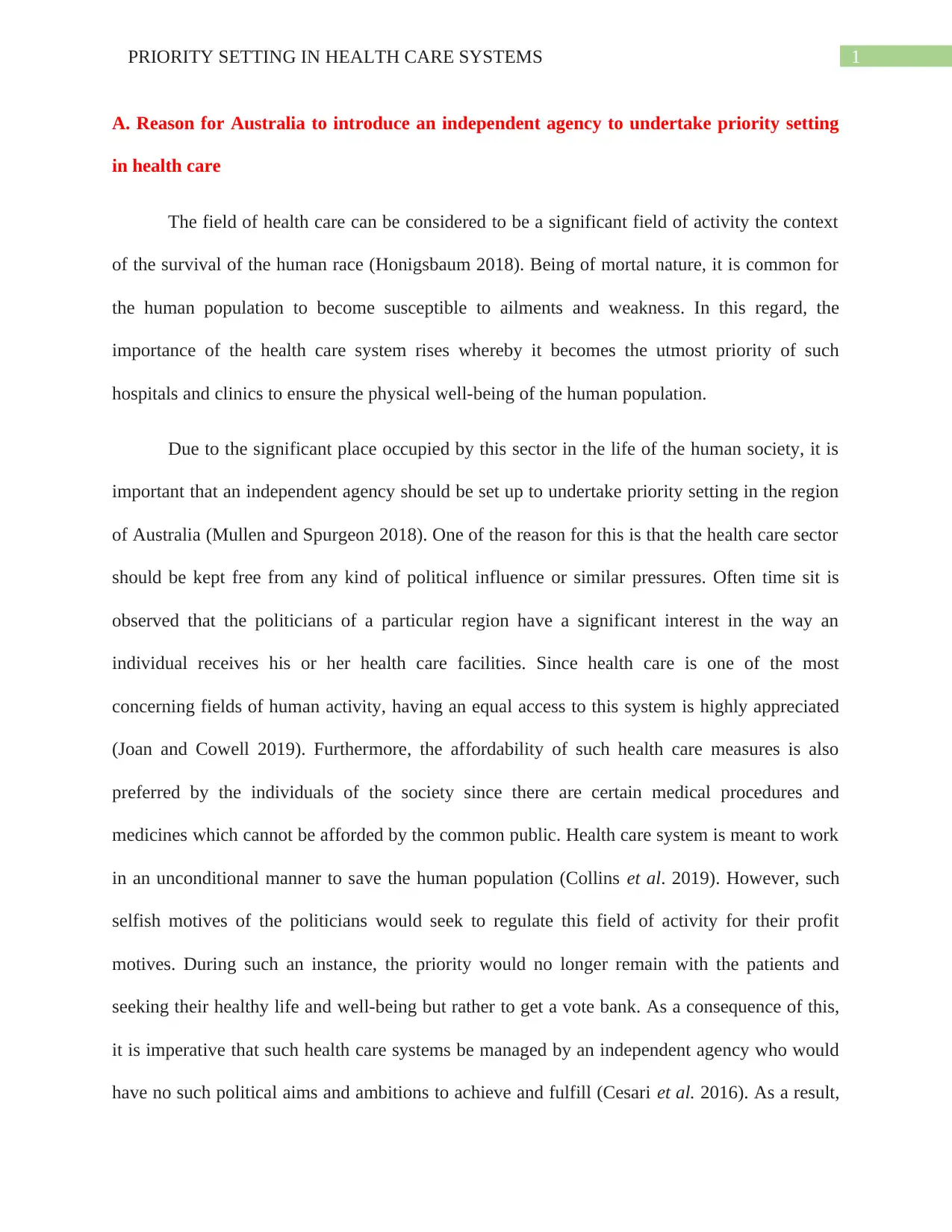
1PRIORITY SETTING IN HEALTH CARE SYSTEMS
A. Reason for Australia to introduce an independent agency to undertake priority setting
in health care
The field of health care can be considered to be a significant field of activity the context
of the survival of the human race (Honigsbaum 2018). Being of mortal nature, it is common for
the human population to become susceptible to ailments and weakness. In this regard, the
importance of the health care system rises whereby it becomes the utmost priority of such
hospitals and clinics to ensure the physical well-being of the human population.
Due to the significant place occupied by this sector in the life of the human society, it is
important that an independent agency should be set up to undertake priority setting in the region
of Australia (Mullen and Spurgeon 2018). One of the reason for this is that the health care sector
should be kept free from any kind of political influence or similar pressures. Often time sit is
observed that the politicians of a particular region have a significant interest in the way an
individual receives his or her health care facilities. Since health care is one of the most
concerning fields of human activity, having an equal access to this system is highly appreciated
(Joan and Cowell 2019). Furthermore, the affordability of such health care measures is also
preferred by the individuals of the society since there are certain medical procedures and
medicines which cannot be afforded by the common public. Health care system is meant to work
in an unconditional manner to save the human population (Collins et al. 2019). However, such
selfish motives of the politicians would seek to regulate this field of activity for their profit
motives. During such an instance, the priority would no longer remain with the patients and
seeking their healthy life and well-being but rather to get a vote bank. As a consequence of this,
it is imperative that such health care systems be managed by an independent agency who would
have no such political aims and ambitions to achieve and fulfill (Cesari et al. 2016). As a result,
A. Reason for Australia to introduce an independent agency to undertake priority setting
in health care
The field of health care can be considered to be a significant field of activity the context
of the survival of the human race (Honigsbaum 2018). Being of mortal nature, it is common for
the human population to become susceptible to ailments and weakness. In this regard, the
importance of the health care system rises whereby it becomes the utmost priority of such
hospitals and clinics to ensure the physical well-being of the human population.
Due to the significant place occupied by this sector in the life of the human society, it is
important that an independent agency should be set up to undertake priority setting in the region
of Australia (Mullen and Spurgeon 2018). One of the reason for this is that the health care sector
should be kept free from any kind of political influence or similar pressures. Often time sit is
observed that the politicians of a particular region have a significant interest in the way an
individual receives his or her health care facilities. Since health care is one of the most
concerning fields of human activity, having an equal access to this system is highly appreciated
(Joan and Cowell 2019). Furthermore, the affordability of such health care measures is also
preferred by the individuals of the society since there are certain medical procedures and
medicines which cannot be afforded by the common public. Health care system is meant to work
in an unconditional manner to save the human population (Collins et al. 2019). However, such
selfish motives of the politicians would seek to regulate this field of activity for their profit
motives. During such an instance, the priority would no longer remain with the patients and
seeking their healthy life and well-being but rather to get a vote bank. As a consequence of this,
it is imperative that such health care systems be managed by an independent agency who would
have no such political aims and ambitions to achieve and fulfill (Cesari et al. 2016). As a result,
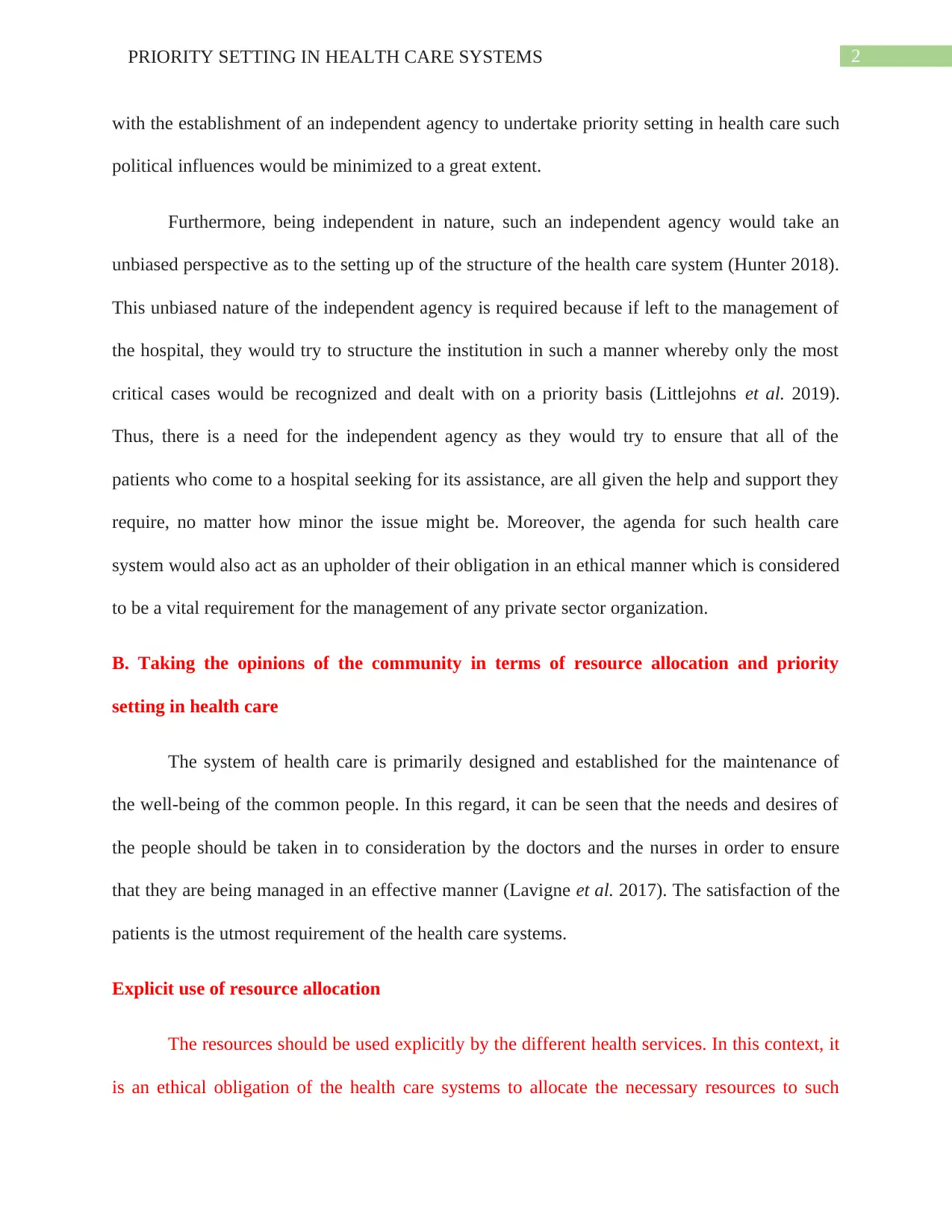
2PRIORITY SETTING IN HEALTH CARE SYSTEMS
with the establishment of an independent agency to undertake priority setting in health care such
political influences would be minimized to a great extent.
Furthermore, being independent in nature, such an independent agency would take an
unbiased perspective as to the setting up of the structure of the health care system (Hunter 2018).
This unbiased nature of the independent agency is required because if left to the management of
the hospital, they would try to structure the institution in such a manner whereby only the most
critical cases would be recognized and dealt with on a priority basis (Littlejohns et al. 2019).
Thus, there is a need for the independent agency as they would try to ensure that all of the
patients who come to a hospital seeking for its assistance, are all given the help and support they
require, no matter how minor the issue might be. Moreover, the agenda for such health care
system would also act as an upholder of their obligation in an ethical manner which is considered
to be a vital requirement for the management of any private sector organization.
B. Taking the opinions of the community in terms of resource allocation and priority
setting in health care
The system of health care is primarily designed and established for the maintenance of
the well-being of the common people. In this regard, it can be seen that the needs and desires of
the people should be taken in to consideration by the doctors and the nurses in order to ensure
that they are being managed in an effective manner (Lavigne et al. 2017). The satisfaction of the
patients is the utmost requirement of the health care systems.
Explicit use of resource allocation
The resources should be used explicitly by the different health services. In this context, it
is an ethical obligation of the health care systems to allocate the necessary resources to such
with the establishment of an independent agency to undertake priority setting in health care such
political influences would be minimized to a great extent.
Furthermore, being independent in nature, such an independent agency would take an
unbiased perspective as to the setting up of the structure of the health care system (Hunter 2018).
This unbiased nature of the independent agency is required because if left to the management of
the hospital, they would try to structure the institution in such a manner whereby only the most
critical cases would be recognized and dealt with on a priority basis (Littlejohns et al. 2019).
Thus, there is a need for the independent agency as they would try to ensure that all of the
patients who come to a hospital seeking for its assistance, are all given the help and support they
require, no matter how minor the issue might be. Moreover, the agenda for such health care
system would also act as an upholder of their obligation in an ethical manner which is considered
to be a vital requirement for the management of any private sector organization.
B. Taking the opinions of the community in terms of resource allocation and priority
setting in health care
The system of health care is primarily designed and established for the maintenance of
the well-being of the common people. In this regard, it can be seen that the needs and desires of
the people should be taken in to consideration by the doctors and the nurses in order to ensure
that they are being managed in an effective manner (Lavigne et al. 2017). The satisfaction of the
patients is the utmost requirement of the health care systems.
Explicit use of resource allocation
The resources should be used explicitly by the different health services. In this context, it
is an ethical obligation of the health care systems to allocate the necessary resources to such
⊘ This is a preview!⊘
Do you want full access?
Subscribe today to unlock all pages.

Trusted by 1+ million students worldwide
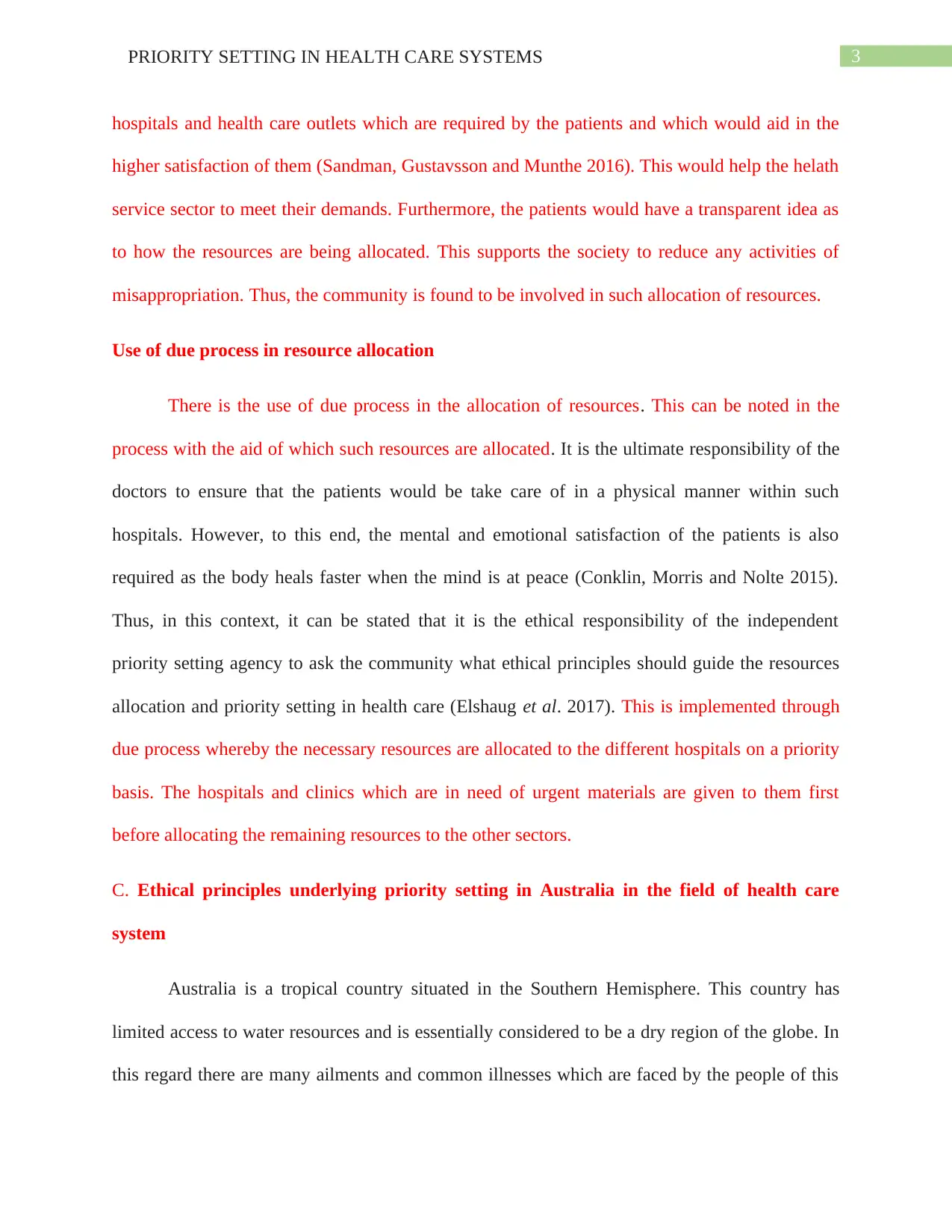
3PRIORITY SETTING IN HEALTH CARE SYSTEMS
hospitals and health care outlets which are required by the patients and which would aid in the
higher satisfaction of them (Sandman, Gustavsson and Munthe 2016). This would help the helath
service sector to meet their demands. Furthermore, the patients would have a transparent idea as
to how the resources are being allocated. This supports the society to reduce any activities of
misappropriation. Thus, the community is found to be involved in such allocation of resources.
Use of due process in resource allocation
There is the use of due process in the allocation of resources. This can be noted in the
process with the aid of which such resources are allocated. It is the ultimate responsibility of the
doctors to ensure that the patients would be take care of in a physical manner within such
hospitals. However, to this end, the mental and emotional satisfaction of the patients is also
required as the body heals faster when the mind is at peace (Conklin, Morris and Nolte 2015).
Thus, in this context, it can be stated that it is the ethical responsibility of the independent
priority setting agency to ask the community what ethical principles should guide the resources
allocation and priority setting in health care (Elshaug et al. 2017). This is implemented through
due process whereby the necessary resources are allocated to the different hospitals on a priority
basis. The hospitals and clinics which are in need of urgent materials are given to them first
before allocating the remaining resources to the other sectors.
C. Ethical principles underlying priority setting in Australia in the field of health care
system
Australia is a tropical country situated in the Southern Hemisphere. This country has
limited access to water resources and is essentially considered to be a dry region of the globe. In
this regard there are many ailments and common illnesses which are faced by the people of this
hospitals and health care outlets which are required by the patients and which would aid in the
higher satisfaction of them (Sandman, Gustavsson and Munthe 2016). This would help the helath
service sector to meet their demands. Furthermore, the patients would have a transparent idea as
to how the resources are being allocated. This supports the society to reduce any activities of
misappropriation. Thus, the community is found to be involved in such allocation of resources.
Use of due process in resource allocation
There is the use of due process in the allocation of resources. This can be noted in the
process with the aid of which such resources are allocated. It is the ultimate responsibility of the
doctors to ensure that the patients would be take care of in a physical manner within such
hospitals. However, to this end, the mental and emotional satisfaction of the patients is also
required as the body heals faster when the mind is at peace (Conklin, Morris and Nolte 2015).
Thus, in this context, it can be stated that it is the ethical responsibility of the independent
priority setting agency to ask the community what ethical principles should guide the resources
allocation and priority setting in health care (Elshaug et al. 2017). This is implemented through
due process whereby the necessary resources are allocated to the different hospitals on a priority
basis. The hospitals and clinics which are in need of urgent materials are given to them first
before allocating the remaining resources to the other sectors.
C. Ethical principles underlying priority setting in Australia in the field of health care
system
Australia is a tropical country situated in the Southern Hemisphere. This country has
limited access to water resources and is essentially considered to be a dry region of the globe. In
this regard there are many ailments and common illnesses which are faced by the people of this
Paraphrase This Document
Need a fresh take? Get an instant paraphrase of this document with our AI Paraphraser
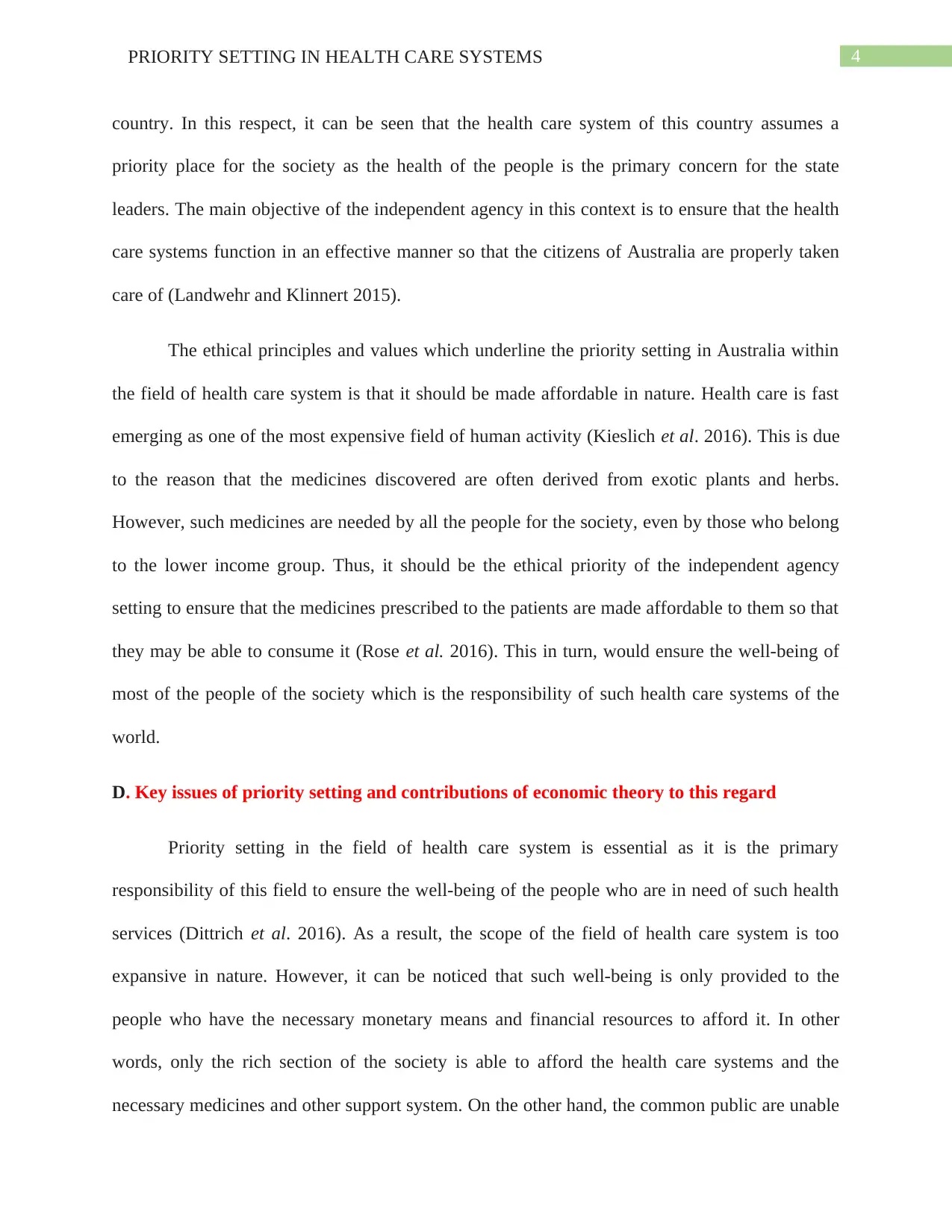
4PRIORITY SETTING IN HEALTH CARE SYSTEMS
country. In this respect, it can be seen that the health care system of this country assumes a
priority place for the society as the health of the people is the primary concern for the state
leaders. The main objective of the independent agency in this context is to ensure that the health
care systems function in an effective manner so that the citizens of Australia are properly taken
care of (Landwehr and Klinnert 2015).
The ethical principles and values which underline the priority setting in Australia within
the field of health care system is that it should be made affordable in nature. Health care is fast
emerging as one of the most expensive field of human activity (Kieslich et al. 2016). This is due
to the reason that the medicines discovered are often derived from exotic plants and herbs.
However, such medicines are needed by all the people for the society, even by those who belong
to the lower income group. Thus, it should be the ethical priority of the independent agency
setting to ensure that the medicines prescribed to the patients are made affordable to them so that
they may be able to consume it (Rose et al. 2016). This in turn, would ensure the well-being of
most of the people of the society which is the responsibility of such health care systems of the
world.
D. Key issues of priority setting and contributions of economic theory to this regard
Priority setting in the field of health care system is essential as it is the primary
responsibility of this field to ensure the well-being of the people who are in need of such health
services (Dittrich et al. 2016). As a result, the scope of the field of health care system is too
expansive in nature. However, it can be noticed that such well-being is only provided to the
people who have the necessary monetary means and financial resources to afford it. In other
words, only the rich section of the society is able to afford the health care systems and the
necessary medicines and other support system. On the other hand, the common public are unable
country. In this respect, it can be seen that the health care system of this country assumes a
priority place for the society as the health of the people is the primary concern for the state
leaders. The main objective of the independent agency in this context is to ensure that the health
care systems function in an effective manner so that the citizens of Australia are properly taken
care of (Landwehr and Klinnert 2015).
The ethical principles and values which underline the priority setting in Australia within
the field of health care system is that it should be made affordable in nature. Health care is fast
emerging as one of the most expensive field of human activity (Kieslich et al. 2016). This is due
to the reason that the medicines discovered are often derived from exotic plants and herbs.
However, such medicines are needed by all the people for the society, even by those who belong
to the lower income group. Thus, it should be the ethical priority of the independent agency
setting to ensure that the medicines prescribed to the patients are made affordable to them so that
they may be able to consume it (Rose et al. 2016). This in turn, would ensure the well-being of
most of the people of the society which is the responsibility of such health care systems of the
world.
D. Key issues of priority setting and contributions of economic theory to this regard
Priority setting in the field of health care system is essential as it is the primary
responsibility of this field to ensure the well-being of the people who are in need of such health
services (Dittrich et al. 2016). As a result, the scope of the field of health care system is too
expansive in nature. However, it can be noticed that such well-being is only provided to the
people who have the necessary monetary means and financial resources to afford it. In other
words, only the rich section of the society is able to afford the health care systems and the
necessary medicines and other support system. On the other hand, the common public are unable
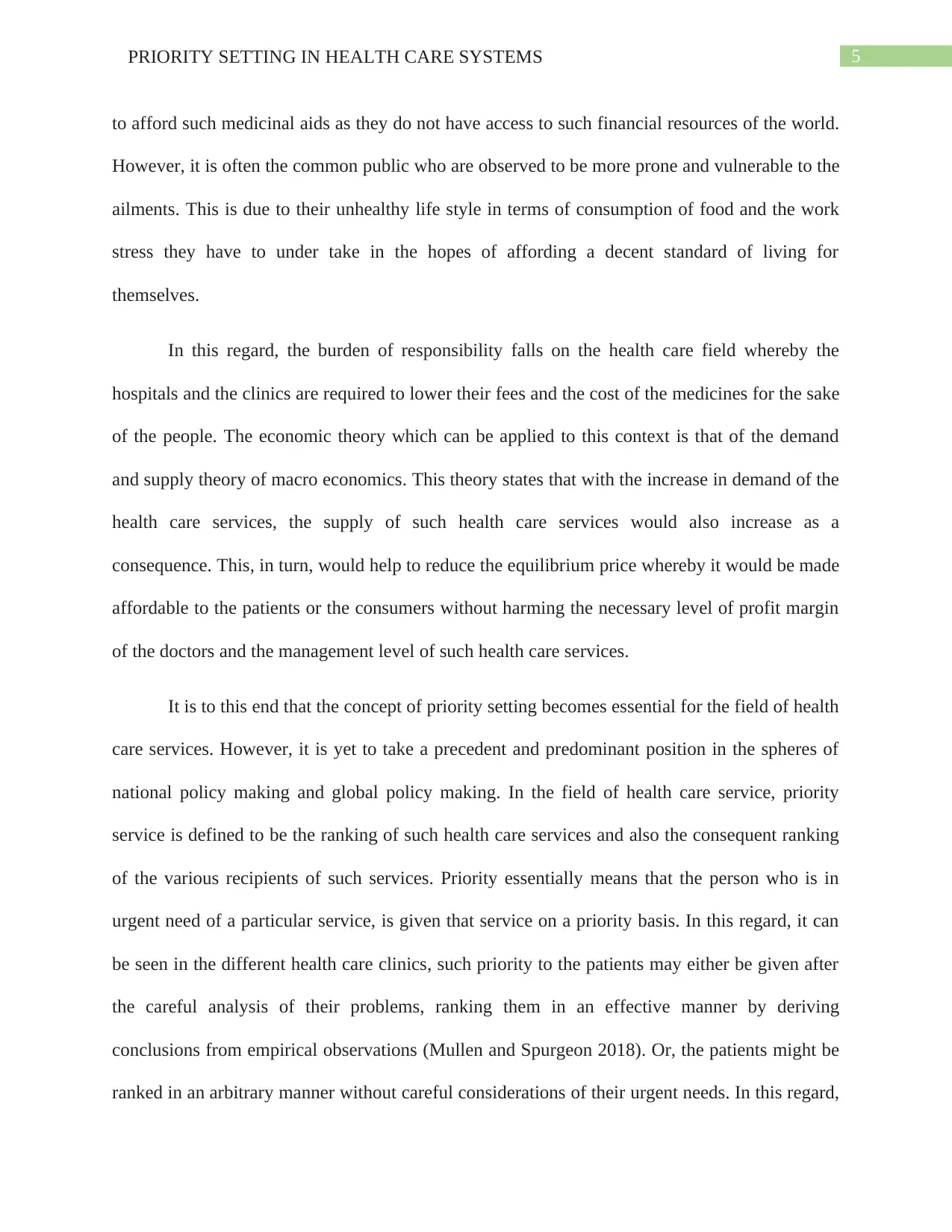
5PRIORITY SETTING IN HEALTH CARE SYSTEMS
to afford such medicinal aids as they do not have access to such financial resources of the world.
However, it is often the common public who are observed to be more prone and vulnerable to the
ailments. This is due to their unhealthy life style in terms of consumption of food and the work
stress they have to under take in the hopes of affording a decent standard of living for
themselves.
In this regard, the burden of responsibility falls on the health care field whereby the
hospitals and the clinics are required to lower their fees and the cost of the medicines for the sake
of the people. The economic theory which can be applied to this context is that of the demand
and supply theory of macro economics. This theory states that with the increase in demand of the
health care services, the supply of such health care services would also increase as a
consequence. This, in turn, would help to reduce the equilibrium price whereby it would be made
affordable to the patients or the consumers without harming the necessary level of profit margin
of the doctors and the management level of such health care services.
It is to this end that the concept of priority setting becomes essential for the field of health
care services. However, it is yet to take a precedent and predominant position in the spheres of
national policy making and global policy making. In the field of health care service, priority
service is defined to be the ranking of such health care services and also the consequent ranking
of the various recipients of such services. Priority essentially means that the person who is in
urgent need of a particular service, is given that service on a priority basis. In this regard, it can
be seen in the different health care clinics, such priority to the patients may either be given after
the careful analysis of their problems, ranking them in an effective manner by deriving
conclusions from empirical observations (Mullen and Spurgeon 2018). Or, the patients might be
ranked in an arbitrary manner without careful considerations of their urgent needs. In this regard,
to afford such medicinal aids as they do not have access to such financial resources of the world.
However, it is often the common public who are observed to be more prone and vulnerable to the
ailments. This is due to their unhealthy life style in terms of consumption of food and the work
stress they have to under take in the hopes of affording a decent standard of living for
themselves.
In this regard, the burden of responsibility falls on the health care field whereby the
hospitals and the clinics are required to lower their fees and the cost of the medicines for the sake
of the people. The economic theory which can be applied to this context is that of the demand
and supply theory of macro economics. This theory states that with the increase in demand of the
health care services, the supply of such health care services would also increase as a
consequence. This, in turn, would help to reduce the equilibrium price whereby it would be made
affordable to the patients or the consumers without harming the necessary level of profit margin
of the doctors and the management level of such health care services.
It is to this end that the concept of priority setting becomes essential for the field of health
care services. However, it is yet to take a precedent and predominant position in the spheres of
national policy making and global policy making. In the field of health care service, priority
service is defined to be the ranking of such health care services and also the consequent ranking
of the various recipients of such services. Priority essentially means that the person who is in
urgent need of a particular service, is given that service on a priority basis. In this regard, it can
be seen in the different health care clinics, such priority to the patients may either be given after
the careful analysis of their problems, ranking them in an effective manner by deriving
conclusions from empirical observations (Mullen and Spurgeon 2018). Or, the patients might be
ranked in an arbitrary manner without careful considerations of their urgent needs. In this regard,
⊘ This is a preview!⊘
Do you want full access?
Subscribe today to unlock all pages.

Trusted by 1+ million students worldwide
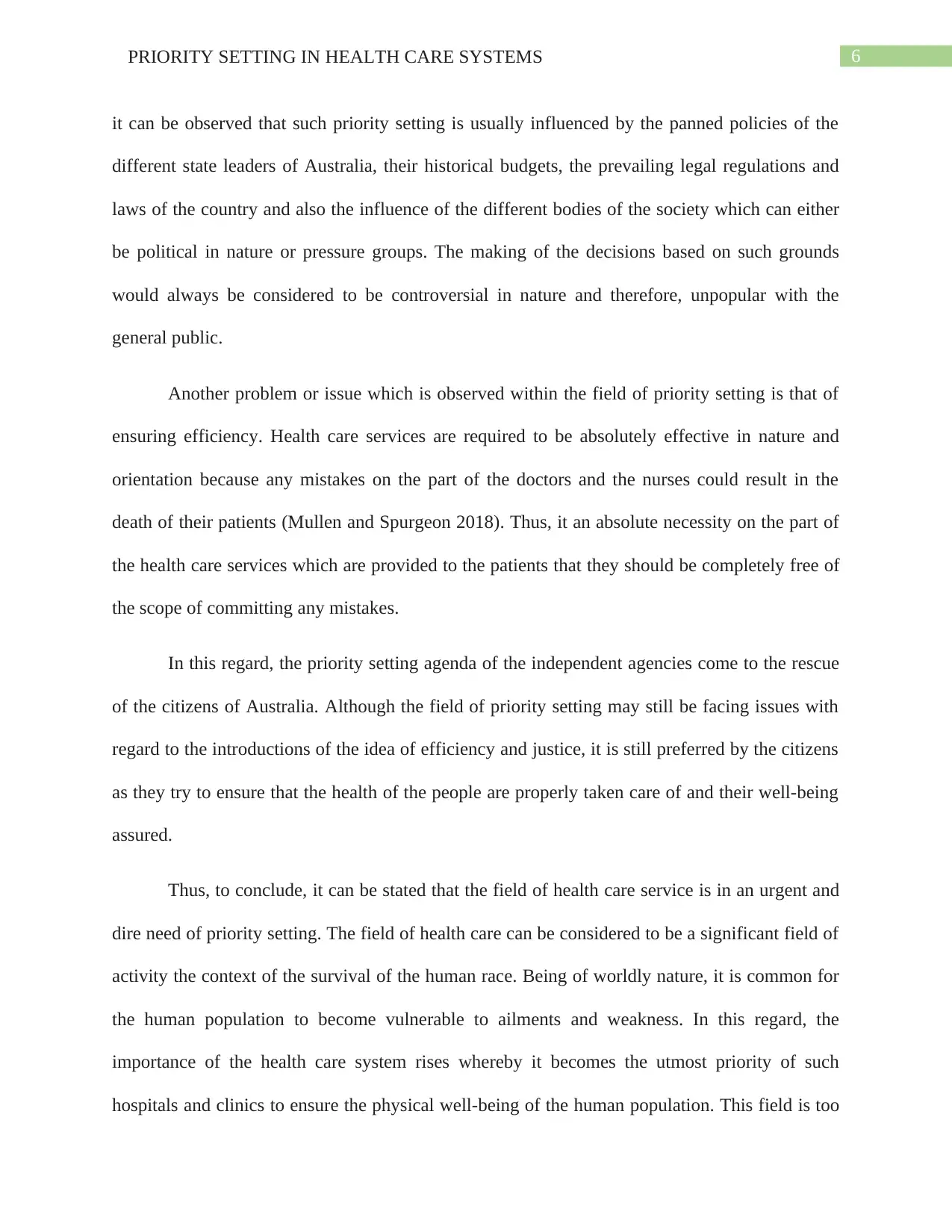
6PRIORITY SETTING IN HEALTH CARE SYSTEMS
it can be observed that such priority setting is usually influenced by the panned policies of the
different state leaders of Australia, their historical budgets, the prevailing legal regulations and
laws of the country and also the influence of the different bodies of the society which can either
be political in nature or pressure groups. The making of the decisions based on such grounds
would always be considered to be controversial in nature and therefore, unpopular with the
general public.
Another problem or issue which is observed within the field of priority setting is that of
ensuring efficiency. Health care services are required to be absolutely effective in nature and
orientation because any mistakes on the part of the doctors and the nurses could result in the
death of their patients (Mullen and Spurgeon 2018). Thus, it an absolute necessity on the part of
the health care services which are provided to the patients that they should be completely free of
the scope of committing any mistakes.
In this regard, the priority setting agenda of the independent agencies come to the rescue
of the citizens of Australia. Although the field of priority setting may still be facing issues with
regard to the introductions of the idea of efficiency and justice, it is still preferred by the citizens
as they try to ensure that the health of the people are properly taken care of and their well-being
assured.
Thus, to conclude, it can be stated that the field of health care service is in an urgent and
dire need of priority setting. The field of health care can be considered to be a significant field of
activity the context of the survival of the human race. Being of worldly nature, it is common for
the human population to become vulnerable to ailments and weakness. In this regard, the
importance of the health care system rises whereby it becomes the utmost priority of such
hospitals and clinics to ensure the physical well-being of the human population. This field is too
it can be observed that such priority setting is usually influenced by the panned policies of the
different state leaders of Australia, their historical budgets, the prevailing legal regulations and
laws of the country and also the influence of the different bodies of the society which can either
be political in nature or pressure groups. The making of the decisions based on such grounds
would always be considered to be controversial in nature and therefore, unpopular with the
general public.
Another problem or issue which is observed within the field of priority setting is that of
ensuring efficiency. Health care services are required to be absolutely effective in nature and
orientation because any mistakes on the part of the doctors and the nurses could result in the
death of their patients (Mullen and Spurgeon 2018). Thus, it an absolute necessity on the part of
the health care services which are provided to the patients that they should be completely free of
the scope of committing any mistakes.
In this regard, the priority setting agenda of the independent agencies come to the rescue
of the citizens of Australia. Although the field of priority setting may still be facing issues with
regard to the introductions of the idea of efficiency and justice, it is still preferred by the citizens
as they try to ensure that the health of the people are properly taken care of and their well-being
assured.
Thus, to conclude, it can be stated that the field of health care service is in an urgent and
dire need of priority setting. The field of health care can be considered to be a significant field of
activity the context of the survival of the human race. Being of worldly nature, it is common for
the human population to become vulnerable to ailments and weakness. In this regard, the
importance of the health care system rises whereby it becomes the utmost priority of such
hospitals and clinics to ensure the physical well-being of the human population. This field is too
Paraphrase This Document
Need a fresh take? Get an instant paraphrase of this document with our AI Paraphraser
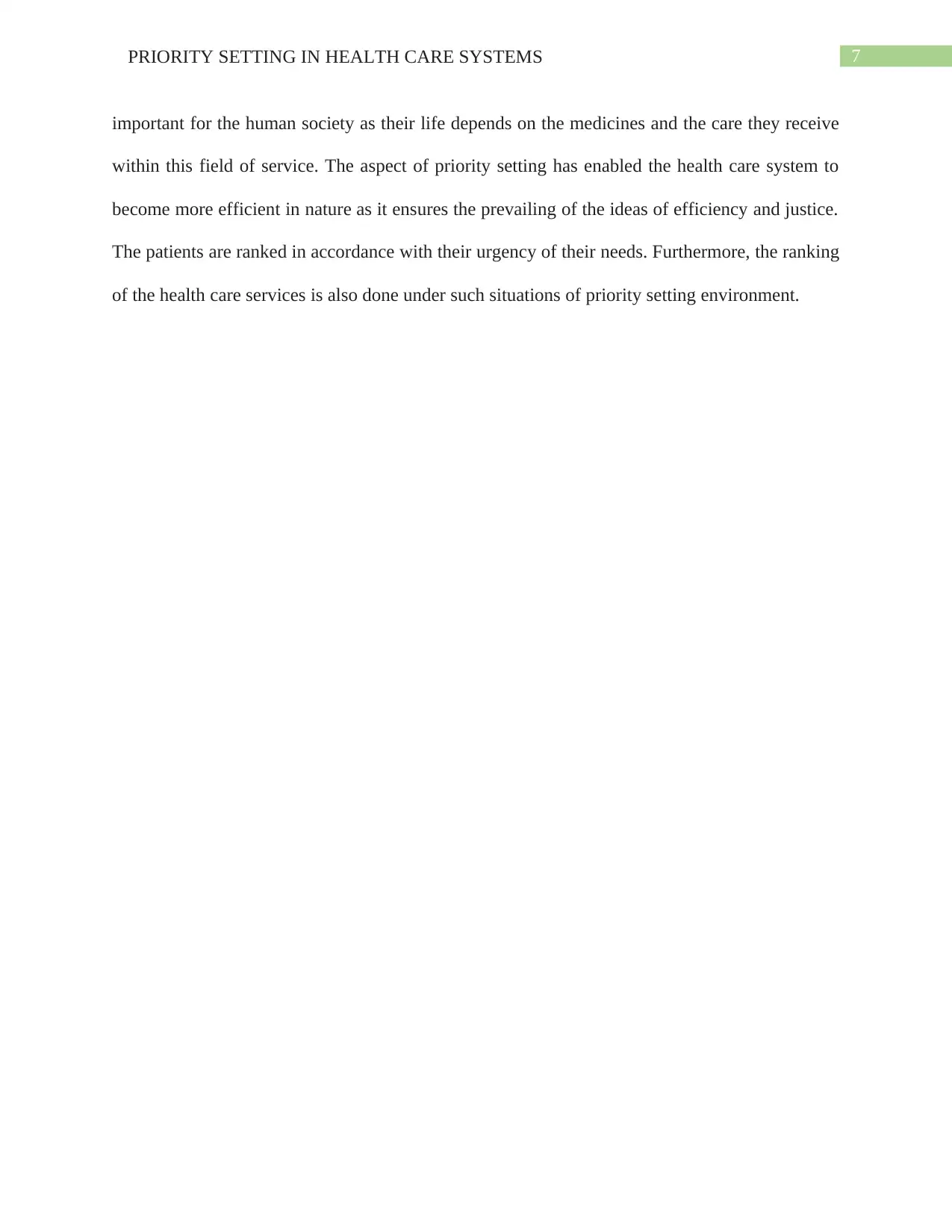
7PRIORITY SETTING IN HEALTH CARE SYSTEMS
important for the human society as their life depends on the medicines and the care they receive
within this field of service. The aspect of priority setting has enabled the health care system to
become more efficient in nature as it ensures the prevailing of the ideas of efficiency and justice.
The patients are ranked in accordance with their urgency of their needs. Furthermore, the ranking
of the health care services is also done under such situations of priority setting environment.
important for the human society as their life depends on the medicines and the care they receive
within this field of service. The aspect of priority setting has enabled the health care system to
become more efficient in nature as it ensures the prevailing of the ideas of efficiency and justice.
The patients are ranked in accordance with their urgency of their needs. Furthermore, the ranking
of the health care services is also done under such situations of priority setting environment.
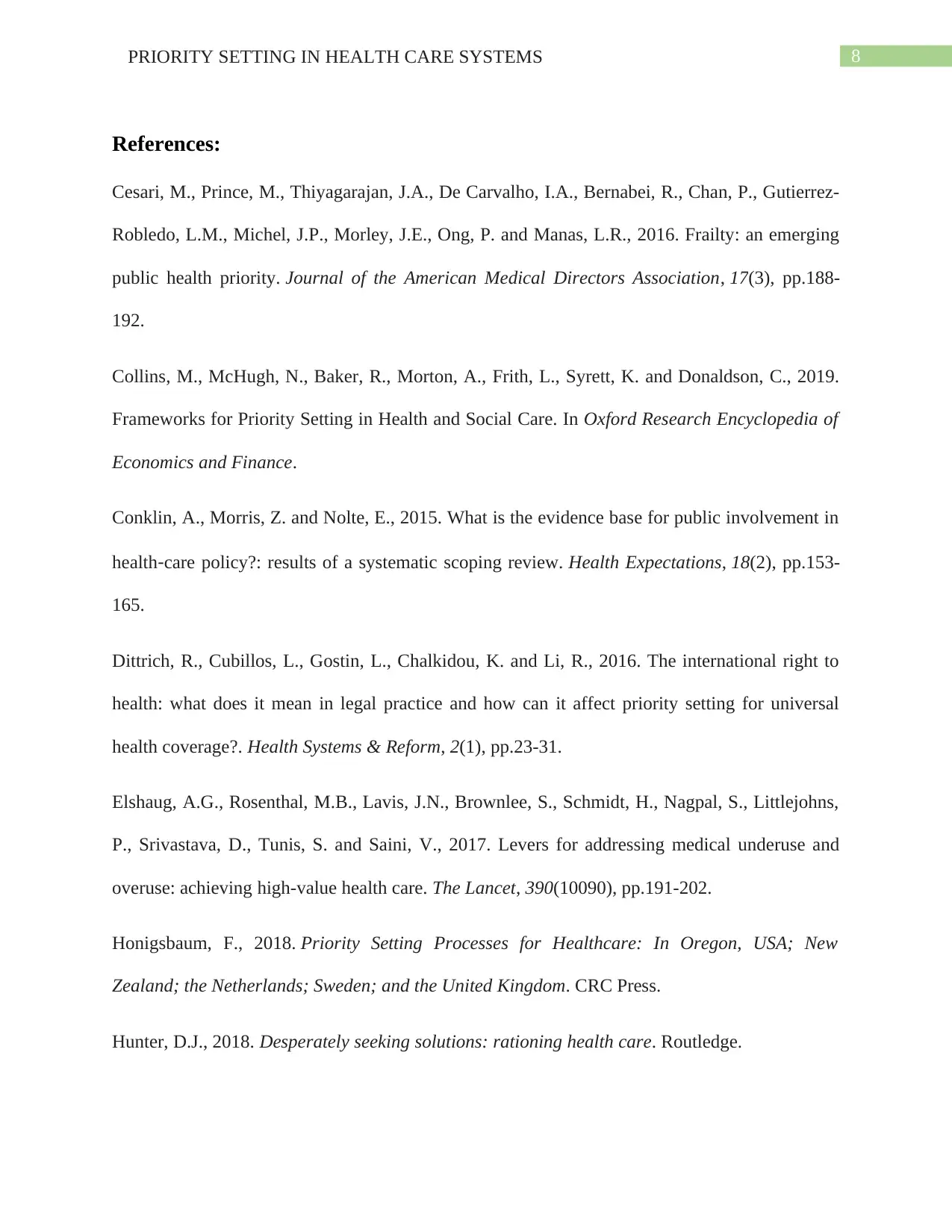
8PRIORITY SETTING IN HEALTH CARE SYSTEMS
References:
Cesari, M., Prince, M., Thiyagarajan, J.A., De Carvalho, I.A., Bernabei, R., Chan, P., Gutierrez-
Robledo, L.M., Michel, J.P., Morley, J.E., Ong, P. and Manas, L.R., 2016. Frailty: an emerging
public health priority. Journal of the American Medical Directors Association, 17(3), pp.188-
192.
Collins, M., McHugh, N., Baker, R., Morton, A., Frith, L., Syrett, K. and Donaldson, C., 2019.
Frameworks for Priority Setting in Health and Social Care. In Oxford Research Encyclopedia of
Economics and Finance.
Conklin, A., Morris, Z. and Nolte, E., 2015. What is the evidence base for public involvement in
health‐care policy?: results of a systematic scoping review. Health Expectations, 18(2), pp.153-
165.
Dittrich, R., Cubillos, L., Gostin, L., Chalkidou, K. and Li, R., 2016. The international right to
health: what does it mean in legal practice and how can it affect priority setting for universal
health coverage?. Health Systems & Reform, 2(1), pp.23-31.
Elshaug, A.G., Rosenthal, M.B., Lavis, J.N., Brownlee, S., Schmidt, H., Nagpal, S., Littlejohns,
P., Srivastava, D., Tunis, S. and Saini, V., 2017. Levers for addressing medical underuse and
overuse: achieving high-value health care. The Lancet, 390(10090), pp.191-202.
Honigsbaum, F., 2018. Priority Setting Processes for Healthcare: In Oregon, USA; New
Zealand; the Netherlands; Sweden; and the United Kingdom. CRC Press.
Hunter, D.J., 2018. Desperately seeking solutions: rationing health care. Routledge.
References:
Cesari, M., Prince, M., Thiyagarajan, J.A., De Carvalho, I.A., Bernabei, R., Chan, P., Gutierrez-
Robledo, L.M., Michel, J.P., Morley, J.E., Ong, P. and Manas, L.R., 2016. Frailty: an emerging
public health priority. Journal of the American Medical Directors Association, 17(3), pp.188-
192.
Collins, M., McHugh, N., Baker, R., Morton, A., Frith, L., Syrett, K. and Donaldson, C., 2019.
Frameworks for Priority Setting in Health and Social Care. In Oxford Research Encyclopedia of
Economics and Finance.
Conklin, A., Morris, Z. and Nolte, E., 2015. What is the evidence base for public involvement in
health‐care policy?: results of a systematic scoping review. Health Expectations, 18(2), pp.153-
165.
Dittrich, R., Cubillos, L., Gostin, L., Chalkidou, K. and Li, R., 2016. The international right to
health: what does it mean in legal practice and how can it affect priority setting for universal
health coverage?. Health Systems & Reform, 2(1), pp.23-31.
Elshaug, A.G., Rosenthal, M.B., Lavis, J.N., Brownlee, S., Schmidt, H., Nagpal, S., Littlejohns,
P., Srivastava, D., Tunis, S. and Saini, V., 2017. Levers for addressing medical underuse and
overuse: achieving high-value health care. The Lancet, 390(10090), pp.191-202.
Honigsbaum, F., 2018. Priority Setting Processes for Healthcare: In Oregon, USA; New
Zealand; the Netherlands; Sweden; and the United Kingdom. CRC Press.
Hunter, D.J., 2018. Desperately seeking solutions: rationing health care. Routledge.
⊘ This is a preview!⊘
Do you want full access?
Subscribe today to unlock all pages.

Trusted by 1+ million students worldwide
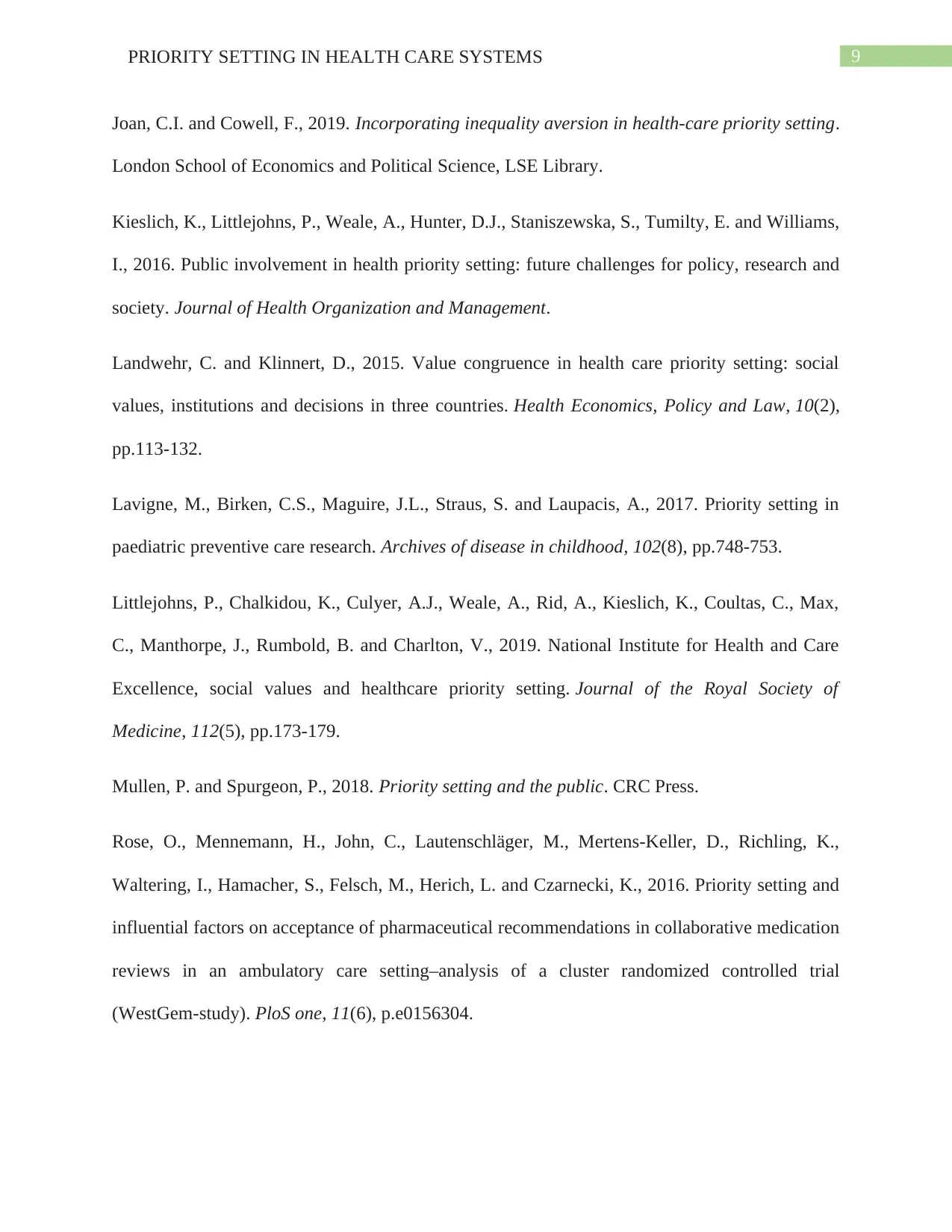
9PRIORITY SETTING IN HEALTH CARE SYSTEMS
Joan, C.I. and Cowell, F., 2019. Incorporating inequality aversion in health-care priority setting.
London School of Economics and Political Science, LSE Library.
Kieslich, K., Littlejohns, P., Weale, A., Hunter, D.J., Staniszewska, S., Tumilty, E. and Williams,
I., 2016. Public involvement in health priority setting: future challenges for policy, research and
society. Journal of Health Organization and Management.
Landwehr, C. and Klinnert, D., 2015. Value congruence in health care priority setting: social
values, institutions and decisions in three countries. Health Economics, Policy and Law, 10(2),
pp.113-132.
Lavigne, M., Birken, C.S., Maguire, J.L., Straus, S. and Laupacis, A., 2017. Priority setting in
paediatric preventive care research. Archives of disease in childhood, 102(8), pp.748-753.
Littlejohns, P., Chalkidou, K., Culyer, A.J., Weale, A., Rid, A., Kieslich, K., Coultas, C., Max,
C., Manthorpe, J., Rumbold, B. and Charlton, V., 2019. National Institute for Health and Care
Excellence, social values and healthcare priority setting. Journal of the Royal Society of
Medicine, 112(5), pp.173-179.
Mullen, P. and Spurgeon, P., 2018. Priority setting and the public. CRC Press.
Rose, O., Mennemann, H., John, C., Lautenschläger, M., Mertens-Keller, D., Richling, K.,
Waltering, I., Hamacher, S., Felsch, M., Herich, L. and Czarnecki, K., 2016. Priority setting and
influential factors on acceptance of pharmaceutical recommendations in collaborative medication
reviews in an ambulatory care setting–analysis of a cluster randomized controlled trial
(WestGem-study). PloS one, 11(6), p.e0156304.
Joan, C.I. and Cowell, F., 2019. Incorporating inequality aversion in health-care priority setting.
London School of Economics and Political Science, LSE Library.
Kieslich, K., Littlejohns, P., Weale, A., Hunter, D.J., Staniszewska, S., Tumilty, E. and Williams,
I., 2016. Public involvement in health priority setting: future challenges for policy, research and
society. Journal of Health Organization and Management.
Landwehr, C. and Klinnert, D., 2015. Value congruence in health care priority setting: social
values, institutions and decisions in three countries. Health Economics, Policy and Law, 10(2),
pp.113-132.
Lavigne, M., Birken, C.S., Maguire, J.L., Straus, S. and Laupacis, A., 2017. Priority setting in
paediatric preventive care research. Archives of disease in childhood, 102(8), pp.748-753.
Littlejohns, P., Chalkidou, K., Culyer, A.J., Weale, A., Rid, A., Kieslich, K., Coultas, C., Max,
C., Manthorpe, J., Rumbold, B. and Charlton, V., 2019. National Institute for Health and Care
Excellence, social values and healthcare priority setting. Journal of the Royal Society of
Medicine, 112(5), pp.173-179.
Mullen, P. and Spurgeon, P., 2018. Priority setting and the public. CRC Press.
Rose, O., Mennemann, H., John, C., Lautenschläger, M., Mertens-Keller, D., Richling, K.,
Waltering, I., Hamacher, S., Felsch, M., Herich, L. and Czarnecki, K., 2016. Priority setting and
influential factors on acceptance of pharmaceutical recommendations in collaborative medication
reviews in an ambulatory care setting–analysis of a cluster randomized controlled trial
(WestGem-study). PloS one, 11(6), p.e0156304.
Paraphrase This Document
Need a fresh take? Get an instant paraphrase of this document with our AI Paraphraser
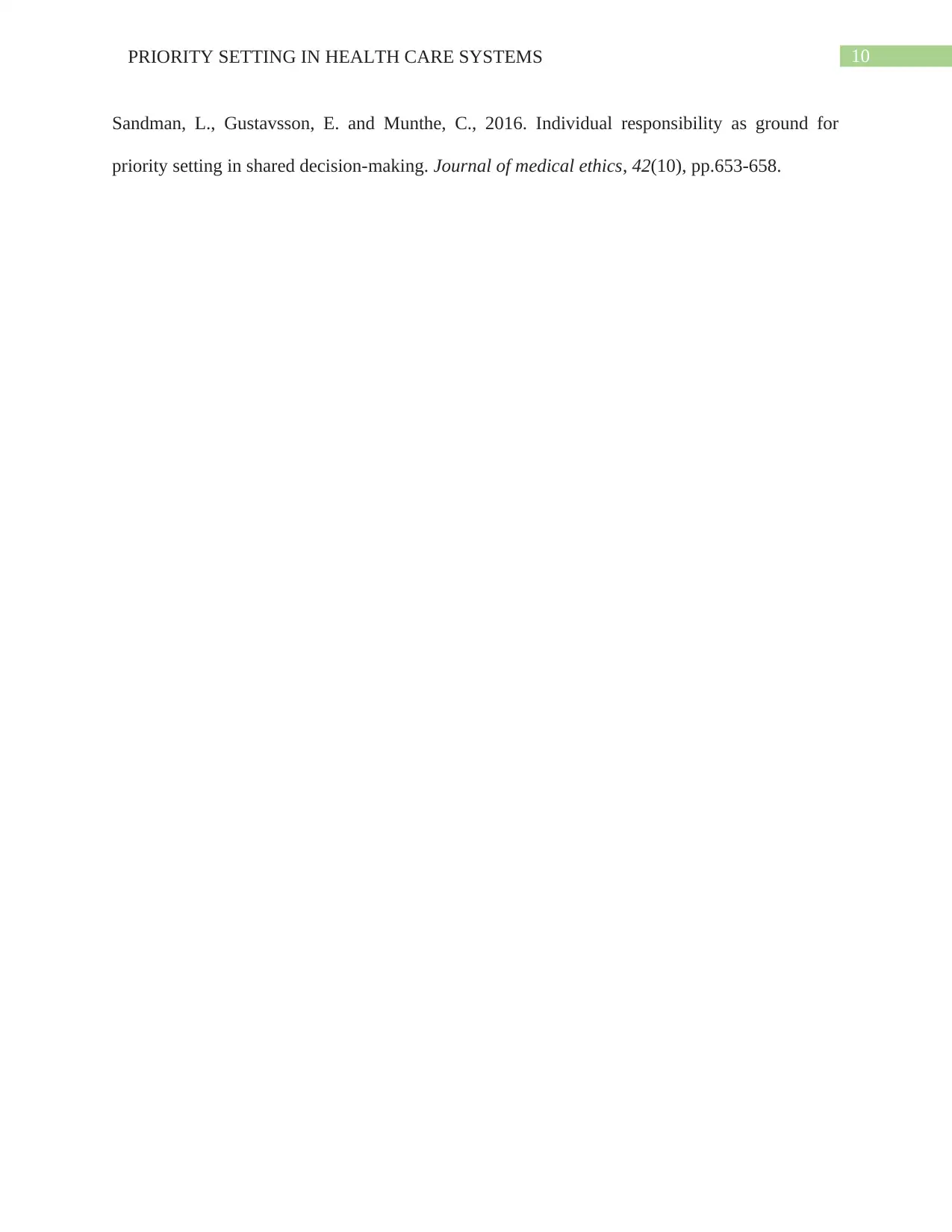
10PRIORITY SETTING IN HEALTH CARE SYSTEMS
Sandman, L., Gustavsson, E. and Munthe, C., 2016. Individual responsibility as ground for
priority setting in shared decision-making. Journal of medical ethics, 42(10), pp.653-658.
Sandman, L., Gustavsson, E. and Munthe, C., 2016. Individual responsibility as ground for
priority setting in shared decision-making. Journal of medical ethics, 42(10), pp.653-658.
1 out of 11
Related Documents
Your All-in-One AI-Powered Toolkit for Academic Success.
+13062052269
info@desklib.com
Available 24*7 on WhatsApp / Email
![[object Object]](/_next/static/media/star-bottom.7253800d.svg)
Unlock your academic potential
Copyright © 2020–2026 A2Z Services. All Rights Reserved. Developed and managed by ZUCOL.





